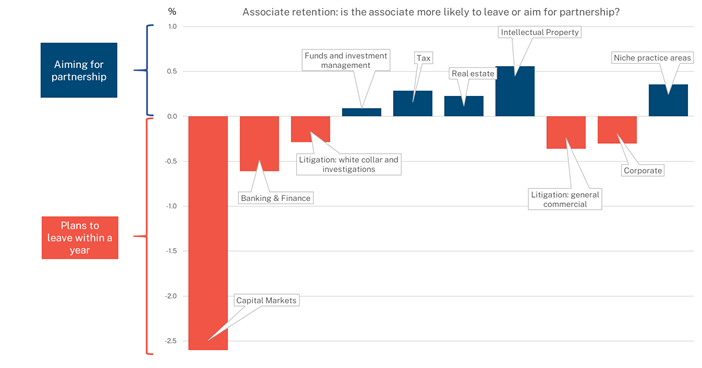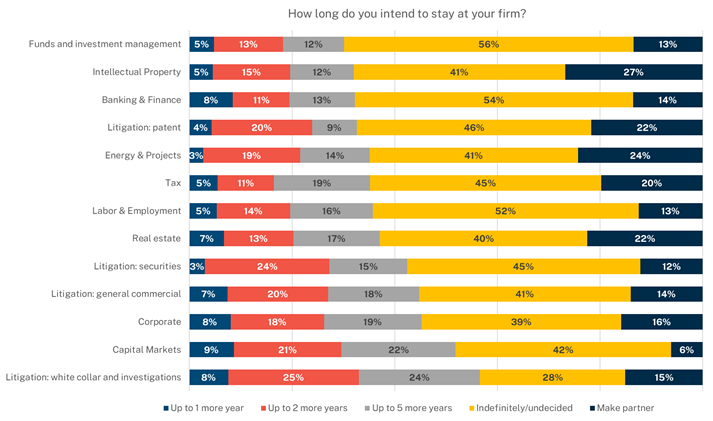
Practice areas vary wildly on how attractive they are long-term. We crunched some figures.
Antony Cooke, October 9, 2020
There is a certain cynicism around the BigLaw recruitment cliché: attend a law school that costs way more than it should (have you ever worked out how much it costs per hour of class time?); pay for it with debt; take a high-paid lawyer job to pay off your debt; suffer much drudgery in your high-paid lawyer job; deal with the debt; leave to do something you want to do; remember the reason you wanted to be a lawyer in the first place.
It's a stereotype that shouldn't have to exist, but this uniquely taut legal economy now exists, and bursting this bubble is beyond the capacity of these graphs we see here. But what they do tell us is that this cynical BigLaw cliché doesn't have to be the case, and isn't the case for those who chose well with their practice areas.
We asked every associate who engaged with our research this year how long they intended to stay at their law firms. We found stark correlations between the length of time a lawyer intends to stay and every single other factor affecting job satisfaction. Contact time with partners and clients, the quality of the training, stress management, diversity policy: all areas gave strong results for those heading for partnership and poor results for those leaving within two years. This sounds obvious, but it sends a message to firms that if they nurture associates better, they will stay. And practice area choice also correlates strongly with retention and loyalty.
Here's how various practice areas perform in retaining associates...

From the graph above we see how the mass-intake areas – corporate, litigation, finance – shed new recruits very quickly, while the niche practice areas are far better at keeping associates for the long-haul. There are several reasons for this. From the perspective of the associate in the niche practice areas, they have often purposefully chosen that route. In areas like IP they studied to fit into a niche, and when they got to do the job the work has fewer shocks: they knew what they were getting into and had a hunch the work would be motivating.

Then from the perspective of the corporate or litigation associate, the conditions are very different: that element of purposeful choice is gone. Your first two years are about finding your feet in the corporate machine, networking with partners and bidding for work in the hope that you'll get work that interests you. But the norm is working on a small section of a huge cross-border deal; it's a tip-top learning experience but personal fulfilment of a deal closed or a case won can be scarce in the lower ranks. Finding that kind of gratification means getting more specific and often that means moving firms.
And no matter how lofty your intellect, all minds seek simplicity and respond better to tangible things over abstract concepts. We know that if a lawyer can visualize an event happening or can see their subject matter with their own eyes, it is more captivating. Which brings us to banking and capital markets and their appetite for notional, almost fictional constructs. These two perform badly in retention partly because so much of the data comes from New York: firm-hopping increases with the size of the economy. But the other reason is the abstract concepts – have you ever tried sketching what a securitization looks like? Feeling the impact of your work is highly motivating for so many. Naturally there are thousands of lawyers who love the adrenaline rush and intellectual gymnastics of a structured finance deal, and they have lots of wise words to share on the topic.
The intention here is not to talk down finance law. It's not a bad thing that these three biggest areas – litigation, corporate and finance – shed staff in such high numbers. It takes working on huge deals to learn how the industry works and we would argue that there is probably no better training ground. But it also takes working on something bewilderingly huge and abstract to urge you to seek something more concrete, and to learn that you need to specialize eventually, if you're going to enjoy being a lawyer.